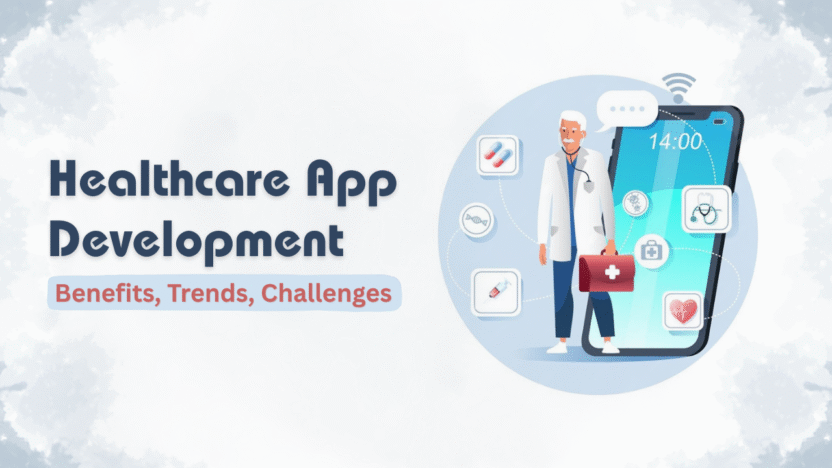“What if your next doctor’s visit didn’t require leaving your couch?” Developers look to encash such opportunities and create a breakthrough, the next app that could disrupt and improve!
What if your next doctor’s visit didn’t require a waiting room, a clipboard of forms, or even leaving your couch?
Once a futuristic fantasy, this question now echoes the new normal. In the wake of a global pandemic, healthcare has evolved beyond physical walls and into the palm of your hand. But how did we get here? And more importantly, what does it take to stay here?
Let’s rewind a bit. Imagine a patient in a remote village, miles from the nearest clinic, receiving specialist advice via a mobile screen. Or a doctor, juggling a dozen appointments, effortlessly managing diagnostics, prescriptions, and patient records—all from a single dashboard. Sounds seamless, doesn’t it? But behind this digital revolution lies a labyrinth of compliance laws, integration challenges, design decisions, and technical innovation.
So We Ask:
- How do mobile app development agencies navigate the tightrope of HIPAA compliance and UX design?
- Are these apps truly improving lives, or merely digitizing old inefficiencies?
- And let’s talk cost: is building a healthcare app an investment, or an uphill battle lined with invisible expenses?
Why Do We Need Healthcare Apps In The First Place?
Why are healthcare apps so vital today? The global population is aging, chronic diseases are rising, and doctor-patient ratios remain underwhelming, especially in developing countries. Meanwhile, digital literacy is climbing, smartphones are omnipresent, and post-pandemic behaviour has shifted decisively towards contactless services. Healthcare apps address supply constraints and user preferences, from booking appointments and virtual consultations to AI-powered symptom checkers. They bridge the gap between care providers and patients.
What Defines A Modern Healthcare App In 2025?
If someone handed you a mobile app and claimed it could replace your clinic visit, what would you expect from it? Just a fancy login screen—or a complete digital healthcare experience?
If we wuestion the fundamentals:
Is On Boarding Just A Login, or A Trust-Building Moment?
Shouldn’t user registration be more than just entering your email? Modern apps now enable secure profile creation with multi-factor authentication, ensuring both ease and confidentiality. But why stop there—shouldn’t patients also be able to manage their medical history and insurance info from the same dashboard?
How Can We Make Consultations Truly “Remote”?
Telemedicine and video consultations allow real-time interactions—but are they secure enough? Top mobile app development agencies ensure these are encrypted and compliant with HIPAA and GDPR. After all, would you trust your diagnosis on an open Wi-Fi network?
Can Scheduling Be Smart Instead of Stressful?
How often do patients miss appointments because of confusing interfaces or lack of reminders? Calendar-synced scheduling, push notifications, and intelligent reminders reduce no-shows and streamline care. Isn’t time as important in healthcare as the medicine itself?
Is Access To Medical History Still A Luxury?
Why do patients still carry physical records in the age of cloud computing? Electronic Health Record integration allows seamless access to patient history for both doctors and patients. Shouldn’t medical decisions be made with full knowledge, not fragmented facts?
Should Your Prescription Be One Click Away?
Why walk to the pharmacy when your prescription can reach it before you do? E-prescriptions and pharmacy delivery integrations make medication management effortless. But are these systems integrated with insurance and copay services too?
Are Wearables Just Fitness Toys – or Life Saving Tools?
Can your smartwatch detect a heart issue before you feel it? Real-time syncing with wearables like Fitbit, Apple Watch, and glucose monitors turns passive data into proactive alerts. This allows for more personalized interventions and improved health outcomes. Isn’t prevention still better than a cure?
Is Payment Still A Pain Point In Healthcare?
Why do medical bills still feel like puzzles to decode? Secure payment gateways, insurance validation, and automated claims simplify this pain. Shouldn’t payments be seamless in a digital-first ecosystem?
Can A Bot Replace A Nurse
What if the first level of triage didn’t require a human? AI-powered chatbots now provide symptom checking and preliminary advice. Can they save time for doctors—and reduce anxiety for patients?
What About Advanced Features – Are They Still The Future or Already The Present?
With patient records selling for hundreds on the dark web, how do we ensure privacy? Blockchain-based encryption and tamper-proof logs prevent breaches. But is your app architecture ready for that level of transparency?
Can machines predict illness before doctors can? How can AI predict diabetes risk before symptoms even show? With machine learning algorithms, healthcare apps now flag anomalies in vitals, alerting providers in advance. Isn’t that the future of proactive care?
Can voice technology empower the elderly? What if your grandma could schedule appointments by simply speaking to the app? Voice assistants and NLP (natural language processing) now make apps accessible for users uncomfortable with typing. Shouldn’t technology adapt to people, not the other way around?
Can language ever be a barrier to healthcare? What happens when a patient doesn’t speak English? Multi-language support ensures healthcare is inclusive, not exclusive. Isn’t healthcare a right—not a luxury for those fluent in tech or English?
Can healthcare be… fun?
Sounds absurd, but gamification can actually improve medication adherence? Apps now reward users for tracking meds, completing health goals, or even walking more. Can behaviour change start with something as simple as a badge?
So, Are These Features Just Shiny Add-ons, or Have They Become The New Healthcare Norm?
When top healthcare app development companies engineer digital solutions today, are they merely adding bells and whistles—or are they meeting new baselines demanded by patients, providers, and policymakers? We need to ask ourselves can an app survive today without seamless teleconsultation? Without EHR integration, can clinicians make timely, informed decisions? What happens if the app can’t interface with wearables or sync with older hospital databases?
What Are The Tangible Benefits of Healthcare Apps?
Do these features sound innovative, or do they genuinely transform the healthcare experience? What happens when technology meets medical care in real time?
For Patients: Is convenience the only win? Can you imagine accessing healthcare anytime, anywhere—no appointments, no traffic, no waiting rooms? What if your doctor was just a tap away at 2 AM? Wouldn’t fewer clinic visits reduce both your costs and stress levels? How much more empowered would you feel if you could track and manage your health data on your phone?
From real-time chats to remote consultations, healthcare apps don’t just reduce wait times but also anxiety, cost, and effort.
But what about those in rural areas or with limited mobility shouldn’t they have the same level of access? Telemedicine and remote monitoring features built right into the app facilitate this.
For Doctors and Hospitals: Can Efficiency Be Life-Saving? Is your clinic drowning in paperwork and no-shows? What if scheduling, prescriptions, and even billing could be automated? Could AI-assisted diagnostics make your decisions faster and more accurate?
Doctors benefit not just from streamlined workflows, but from deeper patient engagement and predictive insights that were unthinkable a decade ago. Wouldn’t fewer cancellations and better-prepared patients translate to better outcomes?
For Healthcare Providers and Businesses: Is There ROI in Compassion?
- Can an app improve both patient care and the bottom line?
- What if a well-designed app boosted your brand trust while opening
- new revenue streams through subscriptions or value-added services?
The answer is yes. Healthcare apps aren’t just convenient—they’re commercially and clinically smart.
So, are these benefits theoretical?
To some extent. They’re reshaping how care is delivered, received, and monetised—in real, measurable ways.
How Are Emerging Trends Redefining Healthcare App Development Today?
- Imagine AI bots offering post-operative care tips or reminding elderly patients about their meds. That’s already happening.
- Data from glucose monitors, pacemakers, and fitness trackers is being fed into apps in real-time, enabling proactive care.
- Apps for meditation, therapy, and emotional tracking are rising faster than gym memberships.
- Rehabilitation apps now use AR to guide patients through exercises, improving adherence and recovery.
- By analysing user history, behaviour, and genetics, apps can offer custom diet plans, treatments, and warnings.
What Are The Challenges of Building A Healthcare App?
If healthcare apps are changing lives, why isn’t the app store overflowing with medical marvels? What stops every app from becoming the next big thing in digital health? Could it be that, behind the promise of transformation, lie some rather thorny questions?
Can You Truly Guarantee Data Security and Compliance?
Are you sure your app is HIPAA-compliant? Have you accounted for GDPR if you’re operating in Europe? What about safeguarding PHI (Protected Health Information)—do you know what that even entails? And more importantly, what happens when trust, not just data, is compromised in a breach?
How Do You Integrate with Systems Older Than Your Team?
What happens when your shiny new app meets a hospital’s legacy system that still runs on code from the last century? Can your app play nice with EMR/EHR platforms and… fax machines?
Will It Work Seamlessly Across Platforms and Regions?
Does your app perform equally well on Android, iOS, and tablets? What if it’s being used in a rural clinic with poor connectivity—will offline mode keep it running?
Who’s Your User—And Can You Design for All of Them?
Are you designing for a tech-savvy Gen Z user, or a 78-year-old diabetic patient using a phone with one app—calls? How do you create one interface that works intuitively for both?
Can You Make It Profitable Without Compromising Ethics?
How do you monetize a healthcare app responsibly? Is your revenue model sustainable, or will it flatline post-launch?
Now, even top mobile app development agencies face these challenges. So, what are the real-world hurdles and how do they overcome them?
How Much Does It Take To Build A healthcare App?
The cost varies based on the complexity, features, platforms, compliance measures, and choice of region. (figures are not mine, table is copied from best resources across the internet)
| App Type | Estimated Cost (USD) |
| Basic Patient App | $25,000 – $40,000 |
| Telemedicine App | $45,000 – $80,000 |
| Full-scale Hospital App | $100,000 – $300,000 |
| AI + IoT-Integrated App | $250,000+ |
Breaking Down The Investment
| Feature | Estimated Cost (USD) |
| Basic Telemedicine App | 40,000– 40,000–80,000 |
| AI-Powered Diagnostics | 100,000– 100,000–250,000 |
| IoT & Wearable Integration | 80,000– 80,000–150,000 |
| Full-Scale Hospital App | $300,000+ |
What Determines The Cost of Building A Healthcare App – And Is It Always As Expensive As You Think?
Is cost always the elephant in the room when planning healthcare app development? Or could it be a matter of where, how, and with whom you build it?
Let’s explore a few cost-driving questions that smart innovators ask:
- Does location matter?
Why are so many global healthcare brands partnering with mobile app development companies in India?
Could it be that they offer world-class quality at a fraction of Western rates? - What about the technology stack?
Should you choose Flutter for faster cross-platform builds, or go native for full device control?
Can Firebase handle your backend—or do you need a custom HIPAA-compliant architecture? - Are you ready for compliance costs?
How much does adhering to HIPAA or GDPR inflate your budget—by 15%? 20%? Is it worth it for long-term trust?
What’s Fueling The Surge in Healthcare App Development—And Is It Just A Post – Pandemic Trend?
Why is healthcare app development no longer a niche, but a necessity? Is it just the ghost of COVID still lingering, or is something bigger at play? In 2024, digital health investments skyrocketed. But what’s behind this explosion? Could it be that healthcare apps are now driving the very future of medicine? When we can order dinner in three taps, shouldn’t we be able to book a doctor the same way?
Are healthcare systems now judged not by how much they do—but how well they do it? Can apps help track real patient outcomes, not just appointments? With a global shortage of healthcare workers, who fills the gap? Could an app be the next nurse, therapist, or pharmacist for millions?
Why Are Global Healthcare Brands Turning To Indian App Development Companies?
If cost alone were the deciding factor, wouldn’t every country be competing equally? So why is India emerging as a go-to destination for healthcare app development? How do Indian firms manage to deliver robust apps without ballooning costs? How does working while the West sleeps benefit agile development and 24/7 progress?
What happens when engineers already understand HIPAA, GDPR, and global compliance? When it comes to scalability, innovation, and engineering talent, is India quietly leading a global transformation?
If your smartwatch notices a heart anomaly, an AI diagnoses it and connects you with a live physician. An ambulance is dispatched, EHRs are synced, and your insurer is already notified. Too futuristic? Or just a few API calls away? Are we moving toward a world where apps don’t just respond to illness—they prevent it altogether?
Are you the one to build healthcare’s next digital lifeline? What if your next startup doesn’t just solve a tech problem—but saves lives? Can you see healthcare apps not as software, but as trust-driven experiences? If you’re ready to build in this space, answer: Are you partnering with those who understand both tech and trust? Have you explored India’s quiet digital revolution in healthcare innovation?
Because the next game-changer in healthcare may not be in Silicon Valley—but in your codebase.
Conclusion
Is healthcare just a clinic visit—or could your next consultation be powered by an app in your pocket? Discover how top healthcare app development companies are redefining care, and ask yourself: is your brand ready to lead this transformation with ITFirms?



